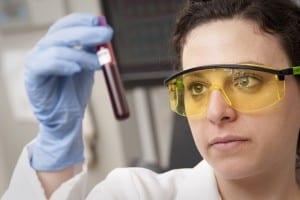Lunch Hour Lecture: Ovarian cancer screening — the long journey
By Ella Richards, on 15 March 2016
Will effective screening for ovarian cancer, one of the most common cancers affecting women, ever become a reality?
A group of researchers started to reach for this goal more than 30 years ago. As Professor Usha Menon (UCL Institute for Women’s Health) explained in her Lunch Hour Lecture, determining a method of diagnosing early stage ovarian cancer is almost in touching distance.
What is ovarian cancer?
Ovarian cancer is cancer of the ovaries and fallopian tubes, and it is the fifth most common cause of cancer-related deaths in women in Europe.
Unfortunately most ovarian cancer patients do not have clear symptoms in the early stages of the disease, meaning that 55% of women with ovarian cancer are diagnosed in stage III or IV, when the cancer is harder to treat.
Moreover, there is a 90% survival rate when ovarian cancer is diagnosed at stage I, however only a 5% to 20% survival rate for five years when diagnosed at stage III or IV. (more…)
 Close
Close





